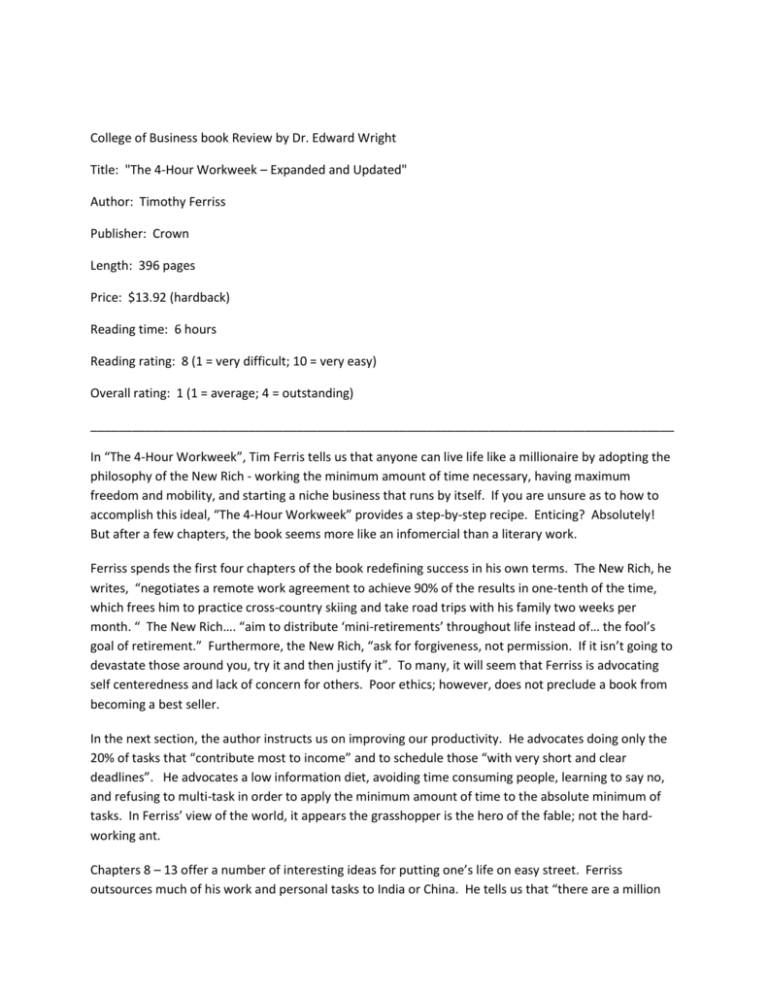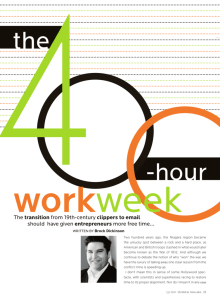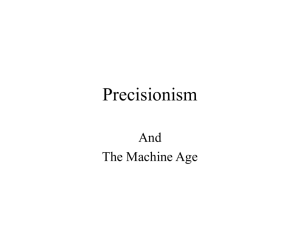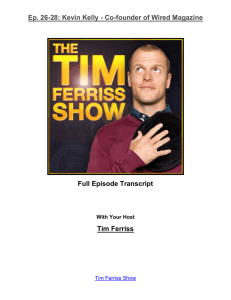College of Business book Review by Dr. Edward Wright Title: "The 4
advertisement

College of Business book Review by Dr. Edward Wright Title: "The 4-Hour Workweek – Expanded and Updated" Author: Timothy Ferriss Publisher: Crown Length: 396 pages Price: $13.92 (hardback) Reading time: 6 hours Reading rating: 8 (1 = very difficult; 10 = very easy) Overall rating: 1 (1 = average; 4 = outstanding) _____________________________________________________________________________________ In “The 4-Hour Workweek”, Tim Ferris tells us that anyone can live life like a millionaire by adopting the philosophy of the New Rich - working the minimum amount of time necessary, having maximum freedom and mobility, and starting a niche business that runs by itself. If you are unsure as to how to accomplish this ideal, “The 4-Hour Workweek” provides a step-by-step recipe. Enticing? Absolutely! But after a few chapters, the book seems more like an infomercial than a literary work. Ferriss spends the first four chapters of the book redefining success in his own terms. The New Rich, he writes, “negotiates a remote work agreement to achieve 90% of the results in one-tenth of the time, which frees him to practice cross-country skiing and take road trips with his family two weeks per month. “ The New Rich…. “aim to distribute ‘mini-retirements’ throughout life instead of… the fool’s goal of retirement.” Furthermore, the New Rich, “ask for forgiveness, not permission. If it isn’t going to devastate those around you, try it and then justify it”. To many, it will seem that Ferriss is advocating self centeredness and lack of concern for others. Poor ethics; however, does not preclude a book from becoming a best seller. In the next section, the author instructs us on improving our productivity. He advocates doing only the 20% of tasks that “contribute most to income” and to schedule those “with very short and clear deadlines”. He advocates a low information diet, avoiding time consuming people, learning to say no, and refusing to multi-task in order to apply the minimum amount of time to the absolute minimum of tasks. In Ferriss’ view of the world, it appears the grasshopper is the hero of the fable; not the hardworking ant. Chapters 8 – 13 offer a number of interesting ideas for putting one’s life on easy street. Ferriss outsources much of his work and personal tasks to India or China. He tells us that “there are a million and one ways to make a million dollars” and presents his recipe for accomplishing this as: 1) Pick an affordably reachable niche market, 2) Brainstorm a product idea 3) Market test your concept and 4) Rollout your product while simultaneously outsourcing the operations to reduce your time requirements Enticing? Absolutely, but can there really be niche, low maintenance businesses out there for everyone? In the remainder of “The 4-Hour Workweek”, Tim Ferriss advocates manipulating your boss into permitting you to work remotely using a variety of unsavory tactics. The objective is to obtain “unrestricted mobility” and to “work wherever and whenever you want.” In this way, one can take trips and vacations while still being paid by an employer. Lastly, and perhaps most believably, Ferriss addresses what to do when one becomes part of the New Rich, only to find that “emptiness and boredom” awaits them. He offers common platitudes such as taking a learning mini-retirement, performing charitable work, and volunteering. By this time, readers might just be wondering whether the Ferriss way is really the smart way at all. Certainly the conventional wisdom of hard work, integrity, and servant-leadership would more reliably lead to a fulfilling sense of self-worth and accomplishment. The title of this book is catchy and the proposition interesting. However, from the recommended unethical tactics to the ultimate goal of leisure and boredom, there is little in this book that is worthwhile. The fact that it made the New York Times best seller list and received a host of endorsements from notables is a sad testimony to our times. _____________________________________________________________________________________ Dr. Ed Wright has 30 years of senior management experience in the medical device industry in locations as diverse as Asheville, NC; San Diego, CA; Syracuse, NY; Raleigh, NC; and Stuttgart, Germany. He is the inventor / co-inventor of five US patents and has overseen the development and launch of several medical products. Dr. Wright serves on the Board of Directors of MPAnalytics, Inc. of Chapel Hill, NC. His research interests include medical technology adoption and marketing theory. For previously reviewed books, visit us at our website at www.wcu.edu/cob/.









